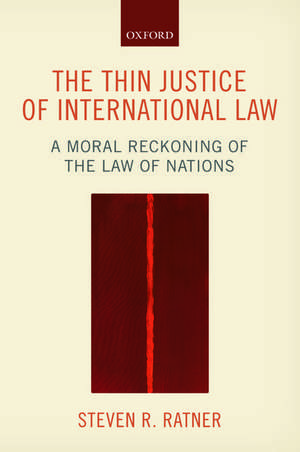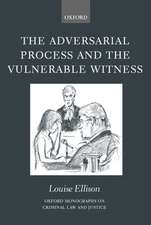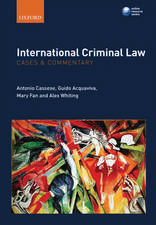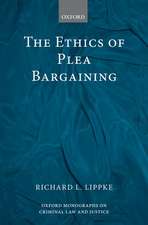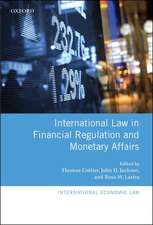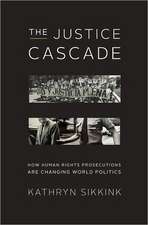The Thin Justice of International Law: A Moral Reckoning of the Law of Nations
Autor Steven R. Ratneren Limba Engleză Paperback – 16 mar 2017
| Toate formatele și edițiile | Preț | Express |
|---|---|---|
| Paperback (1) | 305.88 lei 31-37 zile | |
| OUP OXFORD – 16 mar 2017 | 305.88 lei 31-37 zile | |
| Hardback (1) | 634.36 lei 31-37 zile | |
| OUP OXFORD – 15 ian 2015 | 634.36 lei 31-37 zile |
Preț: 305.88 lei
Nou
Puncte Express: 459
Preț estimativ în valută:
58.54€ • 63.56$ • 49.17£
58.54€ • 63.56$ • 49.17£
Carte tipărită la comandă
Livrare economică 11-17 aprilie
Preluare comenzi: 021 569.72.76
Specificații
ISBN-13: 9780198807155
ISBN-10: 0198807155
Pagini: 488
Dimensiuni: 156 x 234 x 26 mm
Greutate: 0.73 kg
Editura: OUP OXFORD
Colecția OUP Oxford
Locul publicării:Oxford, United Kingdom
ISBN-10: 0198807155
Pagini: 488
Dimensiuni: 156 x 234 x 26 mm
Greutate: 0.73 kg
Editura: OUP OXFORD
Colecția OUP Oxford
Locul publicării:Oxford, United Kingdom
Recenzii
The Thin Justice of International Law provides a unique perspective on the ethical underpinnings of the international legal order and the ability of international law to contribute to a more just world order... [It] is undoubtedly a source from which related interdisciplinary debates can emerge.
The Thin Justice of International Law is carefully written and meticulously argued; it covers a vast array of issues and contemporary debates. Furthermore, it does so with impressive command of the relevant arguments in both law and philosophy. Ratner's conclusions are always judicious and sensible.
Ratner does not limit his engagement with political philosophy to one topic or his philosophical interlocutors to one or two "big names." Rather, he makes the courageous choice to dive into the deep end of contemporary political philosophy, to engage with arguments made by more than two dozen theorists on topics including war, self-determination and secession, state borders, sovereign equality, human rights, universal jurisdiction, global trade, and international investment.
Ratner is able to convey the crux of complex debates in a couple of sentences and he takes many controversial issues head on. The combination of detailed knowledge of international law and its connexion to philosophical conceptions also makes this book a perfect introduction to international law... it needs to be wholeheartedly applauded.
Steven Ratner's The Thin Justice of International Law offers a timely, comprehensive and theoretically rich interdisciplinary theory of international law's relationship with global justice. It is a major contribution to the burgeoning literature on global justice, with a fine eye to legal detail and institutional design.
"Ratner's extensive experience as an expert and adviser to the Unites States' government, international non-governmental organizations and various international institutions on a wide range of issues related to the arbitration of investment disputes, ethnic conflict and human rights violations, territorial disputes, and counter-terrorism strategies brings rich texture to the discussion of the effects of international law rules on protecting peace and respecting human rights. It also marks the book as a vast improvement over the ample scholarly discourse on global justice, which has paid scant attention to the way in which international law operates and the values it embodies. International law is at best marginal to such discourse, and if it plays any role at all is to serve as a contrast to strongly idealized concepts of an international global order"
The Thin Justice of International Law is carefully written and meticulously argued; it covers a vast array of issues and contemporary debates. Furthermore, it does so with impressive command of the relevant arguments in both law and philosophy. Ratner's conclusions are always judicious and sensible.
Ratner does not limit his engagement with political philosophy to one topic or his philosophical interlocutors to one or two "big names." Rather, he makes the courageous choice to dive into the deep end of contemporary political philosophy, to engage with arguments made by more than two dozen theorists on topics including war, self-determination and secession, state borders, sovereign equality, human rights, universal jurisdiction, global trade, and international investment.
Ratner is able to convey the crux of complex debates in a couple of sentences and he takes many controversial issues head on. The combination of detailed knowledge of international law and its connexion to philosophical conceptions also makes this book a perfect introduction to international law... it needs to be wholeheartedly applauded.
Steven Ratner's The Thin Justice of International Law offers a timely, comprehensive and theoretically rich interdisciplinary theory of international law's relationship with global justice. It is a major contribution to the burgeoning literature on global justice, with a fine eye to legal detail and institutional design.
"Ratner's extensive experience as an expert and adviser to the Unites States' government, international non-governmental organizations and various international institutions on a wide range of issues related to the arbitration of investment disputes, ethnic conflict and human rights violations, territorial disputes, and counter-terrorism strategies brings rich texture to the discussion of the effects of international law rules on protecting peace and respecting human rights. It also marks the book as a vast improvement over the ample scholarly discourse on global justice, which has paid scant attention to the way in which international law operates and the values it embodies. International law is at best marginal to such discourse, and if it plays any role at all is to serve as a contrast to strongly idealized concepts of an international global order"
Notă biografică
Steven R. Ratner is the Bruno Simma Collegiate Professor of Law at the University of Michigan Law School. His research has focused on a range of contemporary challenges facing governments and international institutions, including ethnic conflict, territorial borders, implementation of peace agreements, regulation of foreign investment and global business, the normative orders concerning armed conflict, and accountability for human rights violations. For the last ten years his research has concerned issues at the intersection of ethics and international law. Outside the academy, he was a member of the UN Secretary-General's Group of Experts on Cambodia in 1998-99 and of the UN's Panel of Experts on Accountability in Sri Lanka in 2010-11. Since 2009, he has served on the State Department's Advisory Committee on International Law.
